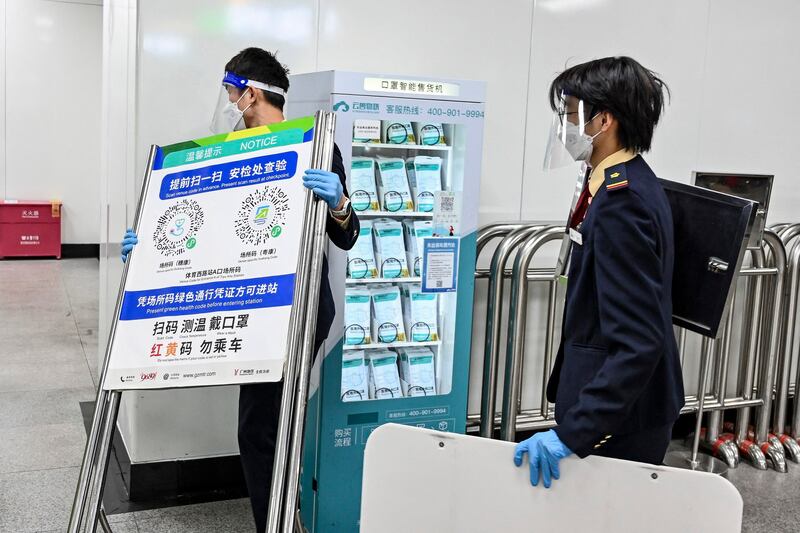The ruling Chinese Communist Party's Youth League appeared to suggest that the recent loosening of strict anti-virus controls was in response to the "white paper revolution" at the end of November, in which mostly young protesters held up blank sheets of printer paper in protest at curbs on free speech and movement.
"Certain opinions regarding pandemic prevention and control measures have been appearing, both online and offline, in recent days," the Communist Youth League central committee said via its official WeChat account, in what is the closest thing to an official admission of responsibility for public anger over the zero-COVID policy to emerge to date.
"Things have now subsided due to timely communication and improvements," it said in a post on Dec. 4.
On Wednesday, China announced a further loosening of its COVID-19 prevention measures, allowing the majority of cases and contacts to quarantine at home in an apparent bid to stave off further anti-lockdown protests and kickstart the economy.
The Youth League commentary comes after Xi reportedly told European Union officials that he saw the protests as being largely driven by young people frustrated by months of pandemic lockdowns and other heavy-handed restrictions.

Reuters quoted EU officials on Dec. 2 as saying that Xi had blamed the mass protests in Chinese cities on youth frustrated by years of the COVID-19 pandemic, adding that the now dominant Omicron variant of the virus paved the way for fewer restrictions.
The rest of the Youth League post was taken up with supporting the official Communist Party line on the protests, however, which claims they were the work of "foreign forces" infiltrating China and inciting young people.
"What do the domestic issues of the Chinese people have to do with the United States?" the post said, in a reference to Secretary of State Antony Blinken's Nov. 30 comments to the media, in which he said Beijing needed to find a way to deal with COVID-19 that "also answers the needs of people."
"Could it be that these events were planned by you?" it said, asking if the United States had infiltrated the protests.
Widespread derision
Beijing's claim that "foreign forces" were infiltrating China has been met with widespread derision among protesters and social media users.
University sources in Shanghai and Sichuan told Radio Free Asia at the time that the Ministry of Education had convened an emergency meeting of hundreds party secretaries and college principals across the country, calling on them to counter "interference by foreign forces," after spontaneous protests on city streets and university campuses in over a dozen cities in late November.
All colleges and universities must do a good job of "ideological work" with students and take strict measures to prevent students from "colluding" with foreign forces, or foreign forces from "interfering," the colleges were told.
While the Youth League's social media post clearly takes a similar line, it is also the closest thing to a public admission that the protests were largely a response to the zero-COVID policy.
"We should be happy that they didn't come out with an April 26 editorial," online commentator Liu Di, who uses the handle Stainless Steel Mouse, said via her Twitter account in a reference to an infamous People's Daily editorial in 1989 that called mass protests on Tiananmen Square a "counterrevolutionary rebellion," paving the way for a massacre of peaceful protesters and civilians by the People's Liberation Army.
Protests worked
Xia Ming, politics professor at New York's City University, said the Youth League post was a further indicator that the protests had worked.
The protests “put pressure on Xi Jinping, and now he has had to relax controls," Xia said. "The zero-COVID policy created a backlash, which was a direct threat to him, because his top priorities are to stay in power and maintain overall stability."
He said that, until the protests happened, the harsh restrictions had been widely expected to continue until at least the annual parliamentary sessions in March.

U.S.-based political commentator Hu Ping said Xi had been forced to make concessions.
"It's not just about ordinary people who are fed up with Xi Jinping's so-called zero-COVID policy,” Hu said. “Plenty of people in the upper echelons of the Communist Party regime are fed up with it too, including a lot of experts who have been pointing out the issues with it for a long time now.”
Xia and Hu both cited widespread dissatisfaction with Xi's rule among the ruling party elite that he believes will force Xi to purge doubters from party ranks ahead of the National People's Congress in March.
Hu said a meeting of the Politburo on Dec. 7 had highlighted "anti-corruption" as a key goal in the coming year. Xi has previously used anti-corruption campaigns to take down his political opponents.
"We must ... persevere in upholding discipline and anti-corruption work, and ... forge an iron army to carry out discipline inspection and supervision work," state news agency Xinhua cited the meeting as saying.
If Xi made a mistake, “he should admit it,” Hu said. “Going after the people who brought up the mistake will only arouse stronger resentment.”
Translated and edited by Luisetta Mudie. Edited by Malcolm Foster.

